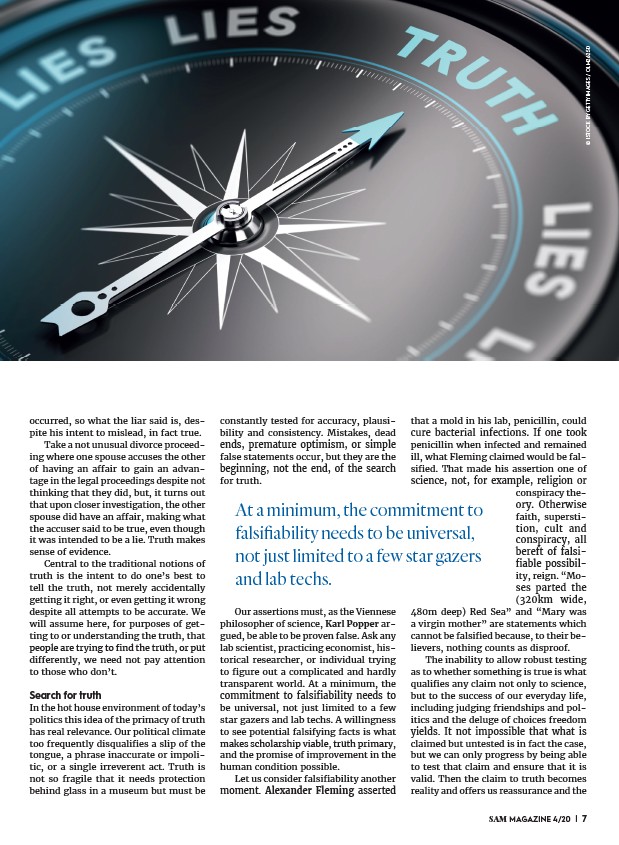
occurred, so what the liar said is, des-pite
his intent to mislead, in fact true.
Take a not unusual divorce proceed-ing
where one spouse accuses the other
of having an affair to gain an advan-tage
in the legal proceedings despite not
thinking that they did, but, it turns out
that upon closer investigation, the other
spouse did have an affair, making what
the accuser said to be true, even though
it was intended to be a lie. Truth makes
sense of evidence.
Central to the traditional notions of
truth is the intent to do one’s best to
tell the truth, not merely accidentally
getting it right, or even getting it wrong
despite all attempts to be accurate. We
will assume here, for purposes of get-ting
to or understanding the truth, that
people are trying to find the truth, or put
differently, we need not pay attention
to those who don’t.
Search for truth
In the hot house environment of today’s
politics this idea of the primacy of truth
has real relevance. Our political climate
too frequently disqualifies a slip of the
tongue, a phrase inaccurate or impoli-tic,
or a single irreverent act. Truth is
not so fragile that it needs protection
behind glass in a museum but must be
constantly tested for accuracy, plausi-bility
and consistency. Mistakes, dead
ends, premature optimism, or simple
false statements occur, but they are the
beginning, not the end, of the search
for truth.
At a minimum, the commitment to
falsifiability needs to be universal,
not just limited to a few star gazers
and lab techs.
Our assertions must, as the Viennese
philosopher of science, Karl Popper ar-gued,
be able to be proven false. Ask any
lab scientist, practicing economist, his-torical
researcher, or individual trying
to figure out a complicated and hardly
transparent world. At a minimum, the
commitment to falsifiability needs to
be universal, not just limited to a few
star gazers and lab techs. A willingness
to see potential falsifying facts is what
makes scholarship viable, truth primary,
and the promise of improvement in the
human condition possible.
Let us consider falsifiability another
moment. Alexander Fleming asserted
© ISTOCK BY GETTYIMAGES / OLM26250
that a mold in his lab, penicillin, could
cure bacterial infections. If one took
penicillin when infected and remained
ill, what Fleming claimed would be fal-sified.
That made his assertion one of
science, not, for example, religion or
conspiracy the-ory.
Otherwise
faith, supersti-tion,
cult and
conspiracy, all
bereft of falsi-fiable
possibil-ity,
reign. “Mo-ses
parted the
(320km wide,
480m deep) Red Sea” and “Mary was
a virgin mother” are statements which
cannot be falsified because, to their be-lievers,
nothing counts as disproof.
The inability to allow robust testing
as to whether something is true is what
qualifies any claim not only to science,
but to the success of our everyday life,
including judging friendships and pol-itics
and the deluge of choices freedom
yields. It not impossible that what is
claimed but untested is in fact the case,
but we can only progress by being able
to test that claim and ensure that it is
valid. Then the claim to truth becomes
reality and offers us reassurance and the
SAM MAGAZINE 4/20 | 7